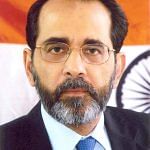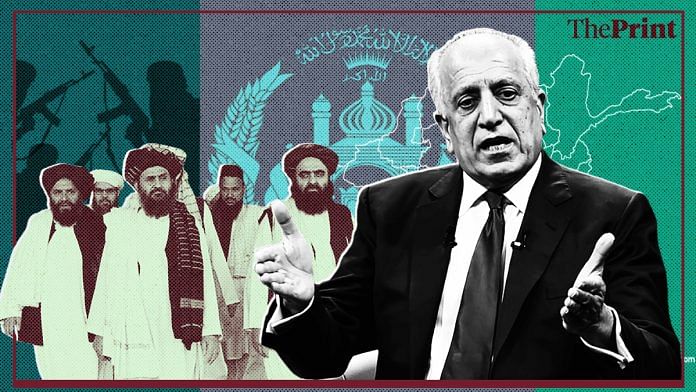China, US, Pakistan and Russia are involved in a peace agreement with the Taliban in Afghanistan. Given India’s heavy diplomatic investment in the country, New Delhi insists on Afghanistan government-led negotiations.
ThePrint asks: Should the Afghan peace process really matter to India?
‘Peace’ just a fig leaf in Afghan talks, every country has its own political agenda
 Rakesh Sood
Rakesh Sood
Distinguished fellow, ORF and former diplomat
There isn’t going to be any peace in Afghanistan because the various talks underway, whether in Doha or Moscow or Islamabad, are not about peace. ‘Peace’ is just a fig leaf for the countries engaged in the process to achieve their own political ends, while Allah takes care of the Afghans.
The US started the process by announcing that it was pulling out troops by September. Since global powers can’t be seen to be losing wars (after all, the US has spent a trillion dollars and lost 2,400 soldiers over 18 years), the US is busy telling the world that Doha is about ‘peace’ and not about its exit.
Russia decided that with the US leaving, it should get back into the Afghan game and so it began to get closer to Pakistan. And Pakistan’s patient investment in the Taliban has paid off. India does not find a welcoming place at the table, but then, neither does the Afghan government.
After the US exits, it will declare an end to its longest war, but it will not end the conflict in Afghanistan because peace in Afghanistan was never the real objective of the current flurry of talks. That is why the Afghans (and India) feel aggrieved.
India needs a constructive position on Afghanistan and not show anxiety over being kept out of loop
 Salman Bashir
Salman Bashir
Former foreign secretary of Pakistan, and former high commissioner of Pakistan to India
Peace and stability in Afghanistan are important for the region. An important stage has now been reached in shaping of a political settlement. The Doha and allied processes involving the US and the Taliban as well as Russia- and China-sponsored initiatives have moved in a positive direction.
A major power consensus seems to be emerging on the aspects of stability and peace in Afghanistan, which is necessary to ensure durability of an Afghan settlement. Afghanistan must not again become an arena for global or regional strategic contestations through proxy warfare. A genuine all-Afghan settlement can be the sole guarantor of peace in the strife-torn country.
Pakistan has been facilitating the peace process due to its geographical contiguity. Our constructive role is being recognised by the Afghans and major powers. Eventually, all major powers and regional states may have to pledge support for a freely arrived political settlement underpinned by a viable security and economic architecture.
Indian strategic community should start to view the emerging regional picture without outdated prisms. The US, I believe, has kept India in the loop. A constructive position by India will be helpful. Undue anxiety on being bypassed is unwarranted.
Also read: Does Pompeo calling Iran, not Pakistan, the biggest terror sponsor undermine India’s stand?
India needs a more pro-active stand; the current peace process doesn’t inspire confidence
 Srinath Raghavan
Srinath Raghavan
Professor of International Relations, Ashoka University
The peace processes in Afghanistan, especially in its current form, is not more than a capitulation and surrender to the Taliban. Despite the limitations India faces, such as not sharing a border with Afghanistan, what should especially concern India is the way this ‘inter-Afghan’ dialogue is playing out. From the US and Russia to Pakistan, everyone has its own vested interest, but from the perspective of the democratically elected government of Afghanistan, this dialogue with the Taliban is a disaster. The hard-fought gains after the 2001 phase, including a democratic setup of governance, and a constitution stand to be frittered away, if this agreement with the Taliban is finalised.
India too has its own interests when it comes to peace in Afghanistan. These include an economic aspect, considering India has heavily invested in the country’s reconstruction, and the approach of common Afghans, who think very highly of India. India’s another interest arises from the direct security threat that a Pakistan-negotiated settlement with the Taliban poses to it. This assumes more relevance in the post-Balakot scenario, with Pakistan looking for ways to hurt India. One obvious way to achieve that is by using Afghanistan’s territory and the Taliban, which it did in the late 1990s, to harbour terrorist groups with anti-India sentiments.
India should take a more pro-active stand since the current peace process doesn’t inspire much confidence. Moreover, India, for reasons stated above, has a larger responsibility to ensure this kind of capitulation to the Taliban doesn’t take place.
Views are personal.
Also read: With Lok Sabha elections over, how can India and Pakistan now repair fractured ties?
Threat of Pakistan and Taliban using Afghan territory to promote jihad against India is real
 Kanwal Sibal
Kanwal Sibal
Executive council member, VIF, and former foreign secretary
Afghanistan is India’s neighbour and a member of SAARC. The country is important to India for historical, geopolitical and security reasons. We have a strategic partnership agreement with it. We have trained their military personnel. A sense of goodwill for India among the people of Afghanistan is enormous. We have invested over US$2 billion in developmental projects in the country.
For Afghanistan, trade ties with India are important, for which the two countries have created an air corridor. Chabahar port will reduce Afghanistan’s dependence on Pakistan and give India access to the country. We had supported the Northern Alliance against the Taliban in the past. Pakistan wants to limit India’s presence in Afghanistan and backs the Taliban to control Afghanistan and counter India’s influence.
The threat of Afghan territory being used by Pakistan and the Taliban to train terrorists and promote jihad against India is real. Central Asia can de destabilised by the Taliban activity in Afghanistan, which will expose us to the threat of religious extremism and terrorism from the region. We must absolutely have a say in the developments in Afghanistan but we are being excluded, with negative consequences for the peace and stability in Afghanistan as well in terms of the gains the Afghans have made in democratic and human rights.
With the US abandoning democracy in Afghanistan, and China, Pakistan and Russia having no stake in the process, the prospects of democratic gains in the country is extremely uncertain.
By Fatima Khan and Shauryavardhan Sharma.




If there is one thing the great powers – with their mutual animosity and suspicion – will ensure, it is that Afghanistan does not become a hub or nursery for terror. That evidently covers terror directed against India as well. India should share its valid and legitimate concerns in this regard with the US / NATO and Russia / China. Beyond that, what matters is the well being and security of the brave, long suffering Afghan people. Special care needs to be taken to preserve the gains girls / women have made in terms of education, employment and more social status and security. 2. As an Indian, achha toh nahin lagta that we figure nowhere in these talks. FS Kanwal Sibal, as usual, takes an extreme position which no reasonable person can subscribe to. Instead of trashing America, China, Russia – Pakistan one can condone – in the same breath, a little introspection is required.